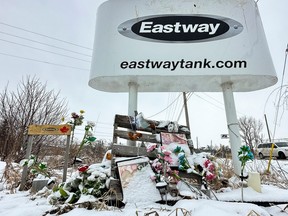The Ontario Ministry of Labour laid three health and safety act charges against the company and its owner, Neil Greene, last year over the 2022 explosion that killed six workers and injured a seventh.

Article content
A tentative plea deal has been reached in connection with health and safety act charges laid against Eastway Tank and its owner following a workplace explosion that killed six employees two years ago.
David McCaskill, a lawyer with the Ontario Ministry of Labour, Training and Skills Development, said all remaining trial dates in the case had been vacated as of Friday.
Advertisement 2
Article content
Article content
The case had been scheduled for a two-month trial.
“We anticipate the matter returning to court on April 5 for a resolution,” McCaskill said in an email Friday following a closed-court session where the plea deal was discussed.
The Ministry of Labour laid three health and safety act charges against Eastway Tank and its owner, Neil Greene, last year — one week before the first anniversary of the explosion that tore apart the main shop of the Merivale Road company early on the afternoon of Jan. 13, 2022.
The explosion triggered a massive fire that took four and a half hours for firefighters to bring under control and left six people dead. Some of the bodies were not recovered for days.
It was among the worst workplace accidents in Ontario during the past 50 years.
The charges against Eastway and its owner were laid under Ontario’s Occupational Health and Safety Act (OHSA). OHSA charges are not criminal, but individuals charged under the act can be jailed for up to one year and fined as much as $100,000.
Corporations can be fined up to $1.5 million under the act.
The provincial charges alleged Eastway and Greene failed to ensure that a “wet test” conducted on site did not produce an explosive vapour, and failed to ensure that the process was carried out in an area without a potential ignition source.
Advertisement 3
Article content
Wet tests are commonly used in the truck-services industry to assess fuel tanks and hoses for leaks. It’s called a wet test because the tanker is first cleaned and then filled with water, or sometimes, diesel fuel.
The provincial charges also alleged Eastway and Greene failed to take reasonable precautions in the workplace and failed to adequately instruct employees on safe fuel storage and handling.
Transport Canada requires leak tests to be conducted annually; more highly pressurized leak tests (hydrostatic tests) are required once every five years.
Ottawa police have yet to announce the results of a parallel investigation to determine if the company was criminally negligent in the case.
In the immediate aftermath of the explosion, Greene defended the 54-year record of the family-owned company, saying it “has always worked to maintain the highest safety standards.”
Some former employees, however, raised questions about the firm’s approach to safety. Josh Bastien, a former Eastway employee, has said his father was so concerned about someone getting hurt at Eastway that he was looking for another job at the time of the explosion.
Advertisement 4
Article content
Eastway employees were just resuming work after lunch when a tanker truck exploded in the main shop.
Six people were killed: Matthew Kearney, 36, a service supervisor and calibration technician; electrician and airplane engineer Etienne Mabiala, 59; welder and Algonquin College graduate Kayla Ferguson, 26, of Carleton Place; electrician Danny Beale, 29, of Ottawa; Russel McLellan, 43, Eastway’s plant manager; and Rick Bastien, 57, a mechanic and welder from Luskville.
A seventh worker pulled from the fire by co-workers received serious burns.
Eastway built, refurbished and serviced fuel and water tanker trucks. That work involved welding, sheet metal, painting, metering, electrical work and the handling of flammable liquids.
Recommended from Editorial
Article content





